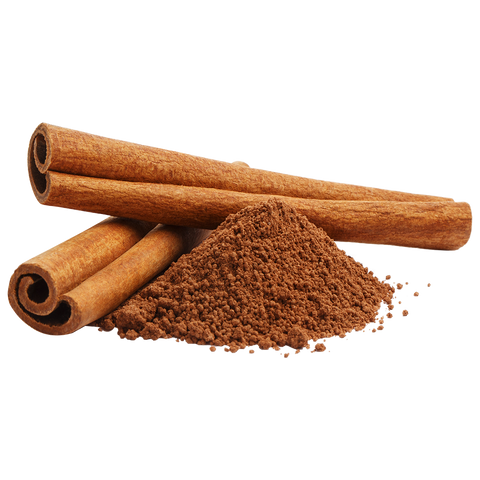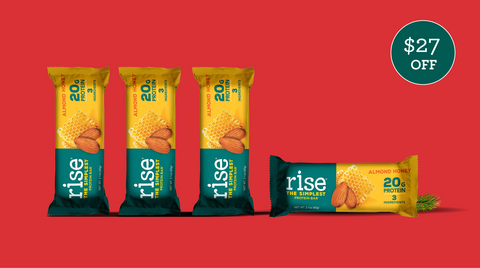Did you know one of the world’s oldest spices is probably sitting in your spice cabinet? It’s cinnamon, and it’s a powerful spice that’s been used for thousands of years. Cinnamon is more than a fun fall spice for your pumpkin lattés and pies; it’s a powerhouse of health benefits. Keep reading to discover the reasons why you should be eating cinnamon right now.
Types of Cinnamon
Your favorite spice has endured quite the journey to wind up in your kitchen. This spice rack staple started its life on the bark of the Cinnamomum verum tree, branching off into different forms like cinnamon sticks, grounds, and even essential oils. Even though these varieties are different, the two main types of cinnamon branch back to cassia and Ceylon cinnamon.
Cassia vs. Ceylon Cinnamon
Cassia cinnamon is the type of cinnamon commonly found in your local grocery store. Ceylon cinnamon is a little harder to find. This is because Ceylon cinnamon is pure, unadulterated cinnamon that’s slightly sweet and lighter in color than cassia cinnamon. Unfortunately, it’s like trying to find a needle in a haystack thanks to its low coumarin levels and delicate taste. For the rest of us home chefs, cassia cinnamon is our go-to.
Nutritional Info of Cinnamon
Now let’s take a look at what’s under the lid of cinnamon. Cinnamon is rich in antioxidants and can pack a punch when it comes to the positive effects on immunity, digestion, and even blood sugar levels (more on this in a bit). Here’s what you get in a single tablespoon of cinnamon (7.8 grams):
Per Tablespoon
|
Calories |
19.3 |
|
Total Carbohydrates |
6.3g |
|
Fiber |
4.1g |
|
Sugar |
0.2g |
|
Total Fat |
0.1g |
|
Saturated Fat |
0.03g |
|
Polyunsaturated Fat |
0.01g |
|
Trans Fat |
0g |
|
Protein |
0.3g |
|
Sodium |
0.8mg |
|
Manganese |
1.4mg |
|
Calcium |
78mg |
|
Iron |
0.6mg |
|
Vitamin K |
2.4mcg |
10 Spicy Benefits of Cinnamon
1. Antioxidants
Cinnamon is brimming with antioxidants that help fight off free radicals and slow the aging process. Yes, eating cinnamon can help you stay youthful and age gracefully thanks to its 41 different protective compounds.
2. Anti-Inflammatory
It's a spice that fights back. Cinnamon's anti-inflammatory properties are known to reduce inflammation and lower the risk of chronic diseases like heart disease, cancer, and more. Thanks, flavonoids. Cinnamon is also known to reduce pain and muscle soreness.
3. Reduce Heart Disease
Cinnamon and your heart are a match made in heaven. Research suggests that cinnamon helps reduce common risk factors for heart disease including high cholesterol levels, high blood pressure, and high triglyceride levels.
4. Lower Blood Sugar
Speaking of blood sugar levels, cinnamon has been linked to lowering blood sugar levels and improving insulin sensitivity. This makes cinnamon a pretty sweet spice for diabetic patients.
5. Brain Function
Thanks to cinnamon’s antioxidant levels, researchers believe that cinnamon can help boost and improve brain function. Cinnamon has also been linked to minimizing the risk of neurological disorders like Alzheimer’s and Parkinson’s disease.
6. Fight Infection
Again with the antioxidants. Because of cinnamon’s powerful antioxidants and anti-inflammatory properties, this spice may help give your immune system a bit of a boost. Cinnamon oil has also been known to help protect against bacterial infections that can cause common colds and pneumonia.
7. Oral Hygiene
Forget the breath mint; there’s a strong link between cinnamon and good oral hygiene. Thanks to cinnamon’s antibacterial properties, this spice may protect against tooth decay, bad breath, infections, and those dreaded cavities.
8. Skin Benefits
Cinnamon has strong antibiotic and antimicrobial properties, making it a perfect solution for skin issues like rashes and allergic reactions. In fact, applying cinnamon oil to the skin can help reduce inflammation, swelling, and redness. Combine cinnamon with raw honey for maximum skin relief.
9. Natural Preservative
Many home chefs don’t know that cinnamon can be used as a natural preservative. Thanks to its antibacterial properties (again), cinnamon can act as a natural preservative for various foods without the need for artificial additives or ingredients.
10. Prevent Candida
Because of its antifungal properties, cinnamon may help treat candida overgrowth. Candida overgrowth happens in your digestive tract. This overgrowth occurs out of an abundantly high amount of candida albicans, which cinnamon can help reduce.

Best Ways to Use Cinnamon
Let’s get to the tea of this article. Literally. Cinnamon can be used to make anything from tea to tiramisu. Check out some of our favorite ways to use cinnamon:
Infuse Liquids Like Wine or Make Tea
It’s mulled wine season. Sip on some serious fall beverages by dropping a cinnamon stick into a cup of tea or a piping hot pot of glühwein. Don’t forget the oranges and star anise.
Sweeten Dishes
Add a pinch of cinnamon to sweeten dishes like oatmeal, smoothies, and desserts for that perfect kick of flavor without a side of guilt.
Add Warmth to Savory Dishes
You can always add warmth to savory dishes like stews, curries, and roasted vegetables with a dash of cinnamon.
Breakfast, Baked Goods, Fall Spice
Fall is the superior season for cinnamon. Why? It just is. Add cinnamon to your morning bowl of cereal, pasties, or to your cup of Joe.
Side Effects
We can’t talk about cinnamon without talking about its potential side effects. Cinnamon typically doesn’t have any side effects, but too much of anything is never good. Mind how much cinnamon you are consuming, as too much could irritate your mouth, lips, and skin.
Get Your Cinnamon Fix in Rise BarsWe like to keep things simple, especially when it comes to food. No matter where you go, Rise Bars always rise to the occasion. Get a taste of cinnamon in every bite of our Snicker Doodle and Sunflower Cinnamon bars. Satisfy your cravings, and savor the flavor of our best-selling cinnamon bars—non-GMO and packed with Gluten-Free goodness. Now that’s a pretty sweet deal.




